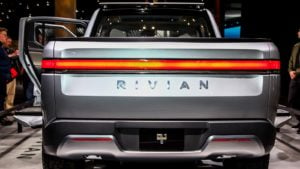Rivian Automotive (NASDAQ:RIVN) stock has already had a wild ride, as it starts mass production of an electric pick-up truck.

Source: Miro Vrlik Photography / Shutterstock.com
Shares opened at $78 on Nov. 10. This brought Rivian $12 billion in cash, Their value then took off in the first week of trading, peaking at $178 each on Nov. 16.
The shares fell back to earth when the company announced it was no longer working with Ford Motor (NYSE:F), which still owns 12% of the stock. Rivian stock closed last week at about $112, a fall of more than 30%. But Rivian still has a market capitalization nearing $100 billion.
The loser was Ford, a century-old auto giant. It’s now worth just $78.9 billion as it ramps up its own electric vehicle efforts. The fall in Rivian’s price also cut $3.6 billion off the value of Ford’s Rivian stake.
Why the Boom?
Shares popped on investor belief that Rivian, unlike previous electric car start-ups, really can take on Tesla (NASDAQ:TSLA) toe-to-toe. The company produced 180 trucks in October and expects to put 1,000 on the road by the end of December.
More important is the support of Amazon (NASDAQ:AMZN), which has ordered 100,000 vans built on the Rivian platform, and has a 20% stake. Rivian is also looking for additional fleet customers.
Rivian stock looks like a rocket, but it’s one that could easily crash, says our Chris Tyler. At its current stock price, each van in Rivian’s order book is being valued at over $1 million. The price of the stock makes no sense.
What Comes Next?
To justify even a fraction of the current RIVN stock price,management must quickly move into mass production, and massive sales. Early production models are reserved for Rivian employees.
Customers who pre-ordered the R1T truck are being told to expect delivery as early as March, or as late as September. The “Launch Edition” vehicles have a range of 314 miles per charge, with a larger, 400-mile battery version planned.
Rivian is already shopping for a second factory location, after opening its plant in Bloomington, Illinois. Georgia seems to be the leading contender. The price of that plant may be scuttling a bill meant to protect independent car dealers against Tesla and other companies selling directly to consumers.
Georgia would also have to beat out Illinois, which was negotiating with Samsung Electronic (OTCMKTS:SSNLF), Rivian’s current battery maker, and with Rivian on a new factory. The rumored Samsung plant would be near Rivian’s existing car plant.
The Georgia location is an hour south of an SK Innovation (OTCMKTS:SKOVF) battery plant being built in the city of Commerce. But Rivian eventually wants to make its own batteries, and the Illinois location might be too union-friendly for it.
The Bottom Line on RIVN Stock
As the fight over plants and distribution networks shows, Rivian Automotive is still a start-up. Before the recent fall in the RIVN stock price, it was a $100 billion start-up that was worth more than Volkswagen (OTCMKTS:VWAGY), an established leader in electric vehicles.
The only word to describe that valuation is bubble. Even if Rivian is the best electric car start-up out there, it still has to prove it can manufacture at scale, and sell the cars that result.
That last question is the one that no one is asking. How fast will customers appear for electric cars from Rivian, Lucid Group (NASDAQ:LCID), Tesla, Volkswagen, Ford, General Motors (NYSE:GM), and everyone else?
We may prove the supply is there for electrics before we know if there is demand. Any hiccup on that front will crash the whole sector.
On the date of publication, Dana Blankenhorn held long positions in AMZN. The opinions expressed in this article are those of the writer, subject to the InvestorPlace.com Publishing Guidelines.
Dana Blankenhorn has been a financial and technology journalist since 1978. Just in time for the holidays he has a collection of COVID-19 stories at the Amazon Kindle store. Write him at [email protected] or tweet him at @danablankenhorn. He writes a Substack newsletter, Facing the Future, which covers technology, markets, and politics.




More Stories
Moon | Cartype
Rivian, Mercedes-Benz Joint Venture Paused
We Blew Up Our $5000 Drag Car ~ Can We Getting Fixed In Time? – Humble Mechanic